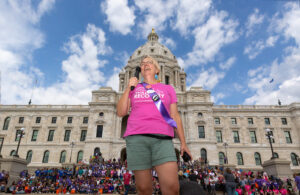
What Recovery Means to Me
Wendy Jones
I am a person in long-term recovery. What that means to me is that I have not used alcohol or mood-altering drugs since March 14, 1994. More than a passage of time without using substances, however, recovery to me is becoming the person I was meant to be rather than someone defined by the consequences of her addiction.
Recovery means I am a tax-paying citizen and a homeowner. It means I found and married the love of my life, Gary. It means I had a long and successful 29-year career with the Minnesota Historical Society and then had the courage to walk away and try a new path. It means I have run twelve marathons, that I am finishing a MPA at the Humphrey School of Public Affairs, and that I volunteer as an election judge. It means I am blessed to have my health, a job that I love, and friends who are my family. It means that I became stronger, rather than self-medicated, with the challenges life continued to send my way even in sobriety. Long-term recovery means that I am alive today to share my story.
Although I entered recovery at the end of my 20s, I didn’t really understand substance use dIsorder or recovery until over twenty years later. In 2017 I was looking for ways to give back to the community through volunteerism, and I discovered Minnesota Recovery Connection (MRC). I thought I might like to help others who were seeking recovery, so I enrolled in MRC’s Recovery Coach Academy to be trained as a Peer Recovery Coach. The experience changed my life.
The Recovery Coach Academy opened my eyes to the science of addiction and recovery. I wondered how I had lived in recovery for over twenty years and did not know that I was managing a chronic disease? It helped me see the deeply ingrained stigma against addiction and the myriad ways in which it influenced attitudes, health care, criminal justice, and public policy. And I finally understood that there are no wrong pathways to recovery. For years I had felt that I’d done something wrong because I never went through a twelve-step program or attended an AA meeting. I had found recovery through a different kind of outpatient program, and through running. I now understood that recovery is never one-size-fits all, but too often our society blames the person, not the treatment, if it fails.
I started volunteering with MRC and became a recovery advocate. Instead of being ashamed to talk about my substance use disorder, I made a point to be open and frank. I had a responsibility to model hope, to show that recovery is possible and that recovery looks like many things. Although I could not have foreseen the turn of events that led to it, eight months after I completed the Recovery Coach Academy I became MRC’s Executive Director. Today, almost three years into the job, I could not be prouder to be serving the recovery community and working on social justice issues in ways I never previously imagined.
Recovery is beautiful, glorious, wonderful and amazing, and it is not without its challenges. I still struggle with some of the underlying issues and behaviors that made me abuse substances and become addicted, but my brain and my body have healed from the disease that hijacked my life. WIth all my heart, I want others to be able to heal, to find recovery and feel no shame in the process. Recovery can start anywhere and anytime. Waiting for someone to hit “rock bottom” before prescribing the care they need is like telling someone we won’t treat your cancer until it hits Stage Five. How many more people could find a path to joining the nearly 23 million Americans living in recovery if there were no shame or stigma attached to addiction, if we approached it as a medical condition, and if we treated each person with compassion instead of punishment? How many more people would be alive today to share their stories?
Imagine if we lived in a recovery-oriented society. A society where everyone understands that substance use disorder is a medical condition and people do recover. A society where choosing recovery means rejecting shame, stigma, and discrimination. A society where people in recovery live life fully. This is the vision I share with you today, and the vision I am working towards every day. I invite you to join me. Together, recovery is possible.
This is an amazing story. You should be so proud of yourself, it gives me hope that my son will have a wonderful future in recovery.